“Falling in Love with a Source” (An Interview with Michael Allman Conrad)
June 18, 2022 in Manuscript Studies
The Research Group Speaks
Episode 7
Saturday 23 July 2022
“Falling in Love with a Source . . .
Or: How Much fou Is There In This amour?”
– An Interview with Michael Allman Conrad
[Posted on 18 June 2022]
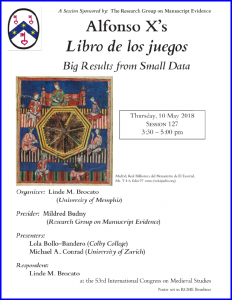
2018 Poster for ‘Libro de los juegos’ Session
The publication this spring by our Associate, Michael Allman Conrad (see also his Curriculum Vitae), of the book which builds upon his Ph.D. Dissertation for Humboldt University, Berlin (2021), gave rise to the invitation to speak for our online series of The Research Group Speaks. This Episode is the 7th in the series.
Planned for Saturday, 23 July 2022, Michael Allman Conrad will consider, in conversation, the choice of subject and the voyage for his Ph.D. Dissertation and its resulting book, in the light of the journey toward discovery which the process called forth. The title reflects on aspects of, or approaches to, Love and dedication to it that might perchance touch or verge upon the complex nature of Amour fou.
If you wish to attend, please contact [email protected].
The Ph. D. Dissertation and its Book
Michael received the Ph.D. from Humboldt University, Berlin, in 2021. We thank him for the invitation to attend the online defense of the dissertation, which offered a model of engaged scholarly discourse.
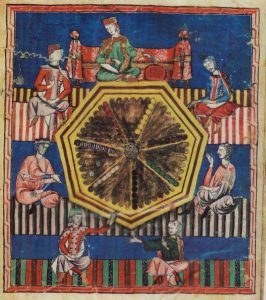
Libro de los juegos. Madrid, El Escorial, MS T.1.6, folio 97 verso, detail. Game of Astronomical Tables. Image Public Domain via Wikimedia Commons.
The book emerging from the dissertation was recently published:
- Michael A. Conrad, Ludische Praxis und Kontingenzbewältigung (De Gruyter, 2022)
Ludische Praxis und Kontingenzbewältigung im Spielebuch Alfonsʼ X.
und anderen Quellen des 13. Jahrhunderts:Spiel als Modell guten Entscheidens(“Ludic Practice and Dealing with Contingency in the Book of Games [Libro de los juegos] of Alfonso X and Other Sources from the Thirteenth Century:
Games as Models of Good Decision-Making”)
The detailed examination, years in the making — as both Michael and the world changed, with more choices and responses — centers upon the remarkable Libro de los Juegos, or Book of Games commissioned by King Alfonso X of Castile. The image on the cover of Michael’s book features the extraordinary image of the Game of Astronomical Tables as illustrated in the manuscript (seen at the right here).
The publisher’s summary describes the scope and strategy of the volume:
Taking [Alfonso’s] book as a starting point, this volume reflects on how games were viewed by Alfons and other contemporary authors as a practice that allowed them to come to terms with contingency and as a model of good decision-making, in particular in the fields of strategy, economics, ethics, and metaphysics.
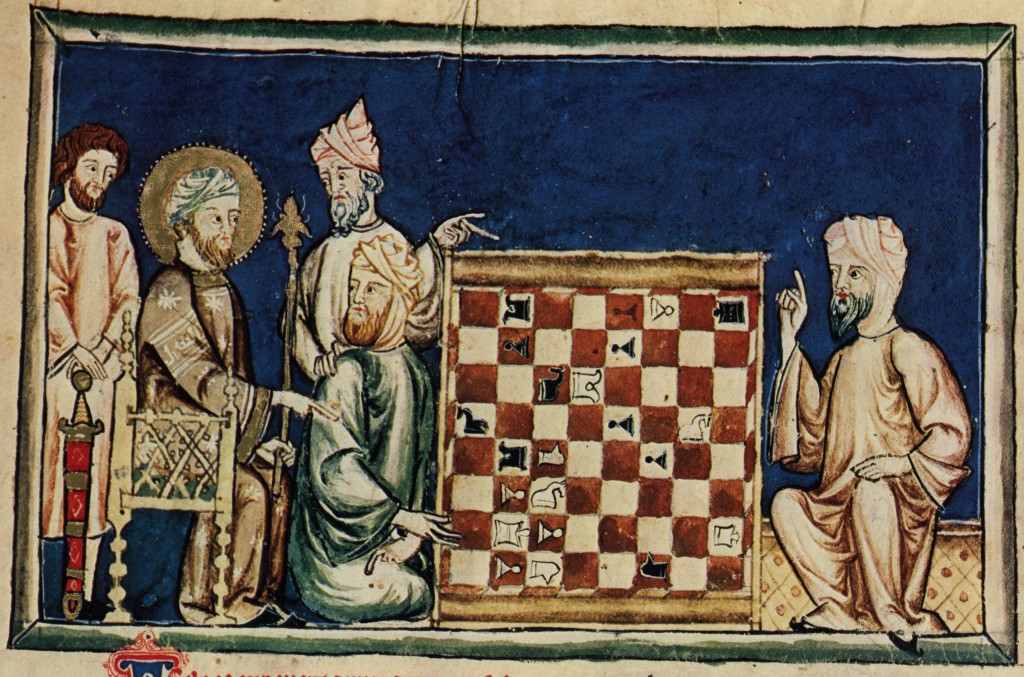
Libro de los juegos. Madrid, El Escorial, MS T.1.6, folio 17 verso, detail. Image via Wikimedia Commons.
Michael offers reflections as a starting point for the conversation in our Episode for The Research Group Speaks.
On Falling in Love with a Source
Or: How Much fou Is There In This amour?
– An Interview
“As you set out for Ithaka
hope your road is a long one
full of adventure, full of discovery.”
— Constantine P. Cavafy, Ithaca (1911)
Re-search is a way of searching; and any search implies a desire to find. Hence, to search always encompasses a feeling of incompletion, a yearning to become complete, to find what has been lost. Ironically, having to complete can become a tragedy in a scholar’s strife against time. Or, isn’t it rather a comedy, provided that any completion in this life necessarily means to give in to the limitations and finiteness of humanity itself?
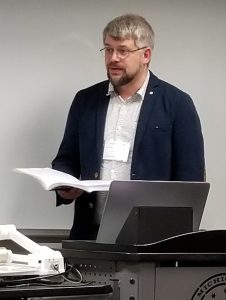
Michael Speaks at our “Embedded Session” at the 2019 Congress. Photography Mildred Budny.
There are many ways as to how scholars may find their subjects, their ideas and inner voice. There are those very technical, rather austere, sterile, and dry methods, such as identifying the lacunae left by others and trying to fill them, diligently and dutifully. Sine ira et studio. Nothing wrong with that, and while the impartial, emotionless and passionless scientist might still seem to be a good role model for some within the scientific community, there are reasons to believe that it is only half the truth. And even though it will seem a tacky stereotype to some, there can be that special moment of inspiration
, when a whole world condenses into one focal point of intensified attention. Call it a heureka or whatever you will. A moment of lucidity, when all doubt is gone as to what you want to dedicate your thought to, when it becomes vital that this is what you just have to write about. But isn’t inspiration also a way of falling in love? It is such love that will make possible to endure a long journey, at times thorny and frustrating, at times pleasant and even exhilarating. It sparks and ignites the light to guide or illuminate our path through darkness. And so we set forth . . .
Yet, on a much lighter note: the motion of search and the motion of love have much in common. “Love is simply the name for the desire and pursuit of the whole,” as Plato said. And while theologians have, rightfully or not, hence described passion as a defect and something undesirable (there is an irony here that should not go unnoted), the joy of dis-covery, of uncovering what is hidden behind the veil of ignorance, is an important driver for us all. When we set out our path to write, it thus is not impossible that we may find us to fall in love with our source material, transforming books, manuscripts, letters, any piece of historical artefact into soulmates to accompany us along our journey that might, or might not, last for many years to come.
And, yet: What kind of love exactly is this that affects us re-searchers in our quest to understand the conundrum lying before us? That is one of the many points to discuss about how the love for a source might push us ahead in spite of our many obstacles along the way, which we might, for the lack of a better term, just call academic life. But if there are so many dangers and frustrations, why, then, oh why, set out at all? Maybe Cavafy has an answer for us?
And if you find her poor, Ithaka won’t have fooled you.
Wise as you will have become, so full of experience,
you’ll have understood by then what these Ithacas mean.
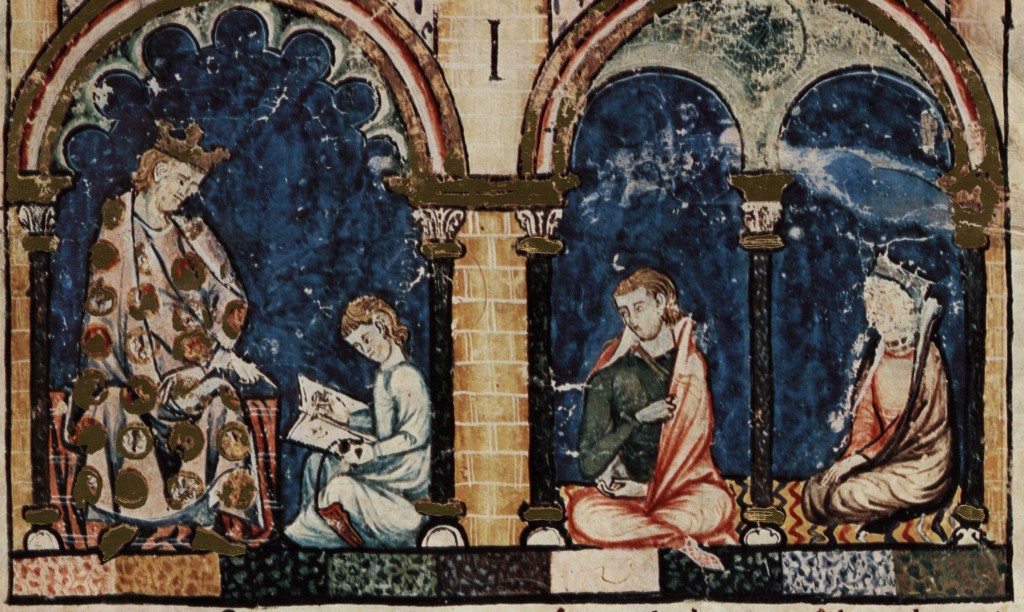
Libro de los juegos. Madrid, El Escorial, folio 1 recto, detail. Image via Creative Commons.
Previews
Already in conversations and with presentations for Research Group events, over several years we have had the opportunity to learn about Michael’s approach to these and other materials of study.
We thank him for his presentations for the RGME about his dissertation subject — among other presentations on other subjects.
1) “In Plain Sight: The Promotion of Astrology and Magic at Royal Courts in the 13th Century in Transcultural Perspective (A Response)”
-
- Presented at the 53rd International Congress on Medieval Studies (Kalamazoo, 2018)
— Abstract of Paper, with a Selected List of Michael’s Publications: Conrad 2018 Congress
- Presented at the 53rd International Congress on Medieval Studies (Kalamazoo, 2018)
2) “Prudence in Play: Alfonso X’s Libro de acedrex e tablas as a Theory of Decision-Making”
-
- Presented at the 54th International Congress on Medieval Studies (Kalamazoo, 2019)
— Abstract of Paper: Conrad 2019 Congress
- Presented at the 54th International Congress on Medieval Studies (Kalamazoo, 2019)
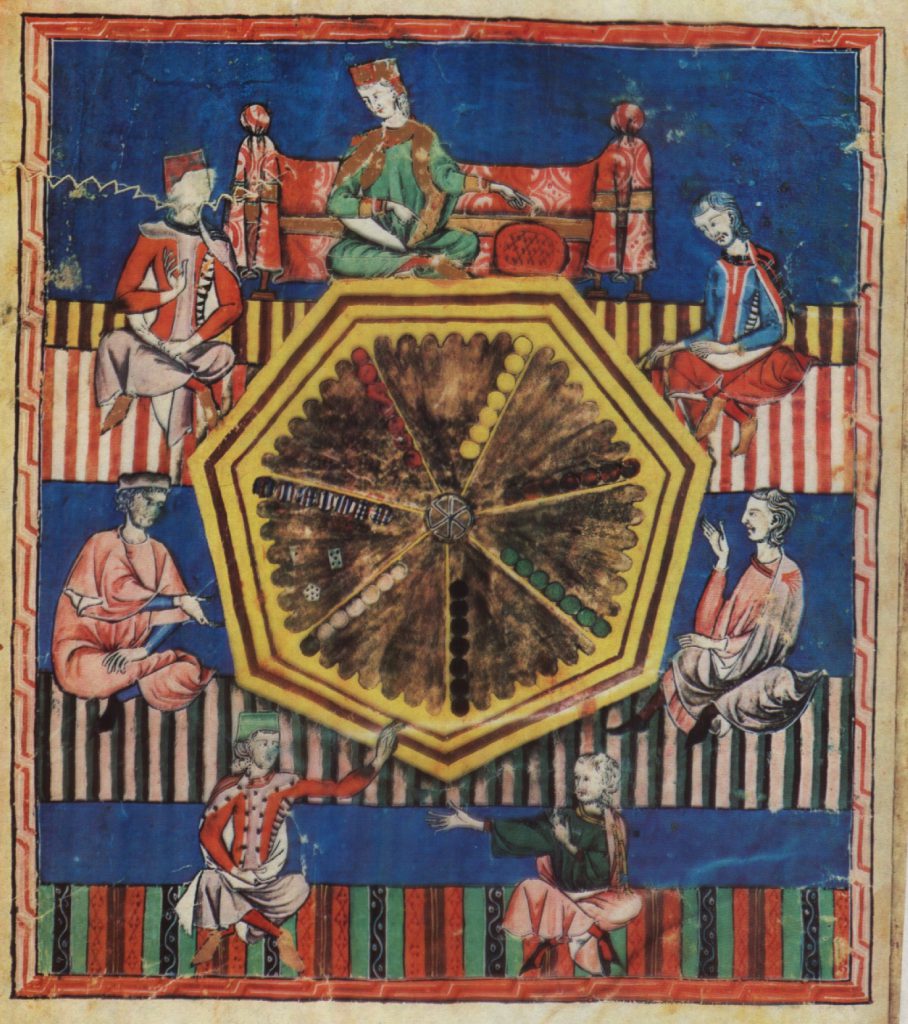
Libro de los juegos. Madrid, El Escorial, MS T.1.6, folio 97 verso, detail. Game of Astronomical Tables. Image Public Domain via Wikimedia Commons.
For Episode 7 of The Research Group Speaks, we look forward to hearing more about the origins, sources, opportunities, challenges, choices, and discoveries involved in engaging in the quest that is this unique and special “Love Story”.
If you wish to attend this online event on Saturday 17 July 2022 EDT, via Zoom, please contact [email protected].
*****
Episode 8 in the series is planned for Saturday 17 September 2022, via Zoom. You are welcome to join us. See
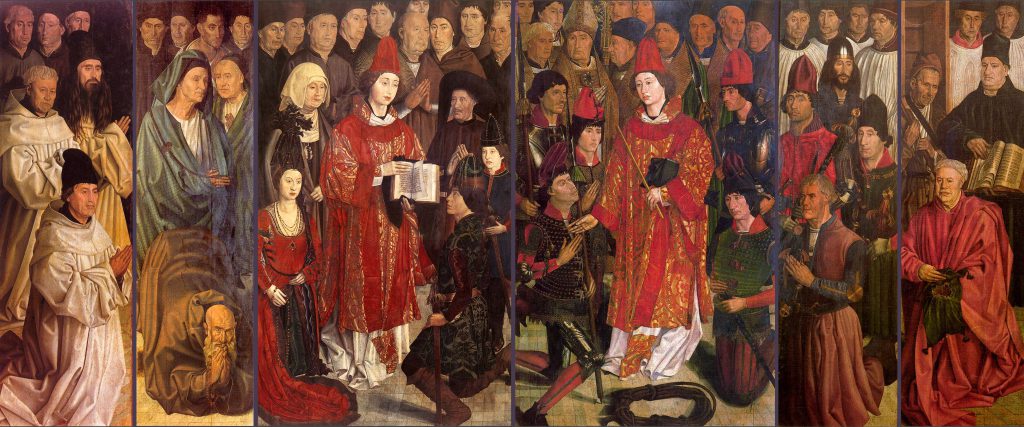
Lisbon, Museu Nacional de Arte Antiga: The mid 15th-century Saint Vincent Panels, attributed to Nuno Gonçalves. Image (https://upload.wikimedia.org/wikipedia/commons/3/3a/Nuno_Gon%C3%A7alves._Paineis_de_S%C3%A3o_Vicente_de_Fora.jpg) via Creative Commons.
*****
